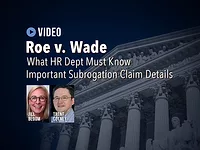Legal Insights
VIDEO: How the FTC’s Noncompete Ban Affects Your Roofing Business
Employers still have certain covenants they can enforce if ban takes effect
In a 3-2 vote on April 23, the Federal Trade Commission approved of a new rule that will ban noncompete agreements for most workers in the United States, meaning they will be free to join competing business or start businesses of their own.
According to the FTC, the rule will result in up to $194 billion in reduced healthcare costs and $400 to $488 billion in increased wages over the next decade. The rule takes effect in 120 days once published in the Federal Register.
Meanwhile, opponents to the rule, such as the U.S. Chamber of Commerce, call the ban “unlawful but also a blatant power grab that will undermine American businesses’ ability to remain competitive.” The chamber said it will sue to block the rule.
In this video, Legal Insights expert Trent Cotney, partner at Adams and Reese, breaks down what the ban will do and how it affects those in the roofing industry, whether they’re a contractor, distributor or manufacturer.
“Once you start unpacking this, it becomes sort of a labyrinth, a morass that you've got to navigate all these different issues. But clearly, this should be top of mind of every employer out there,” said Cotney.
Approximately 30 million workers are currently under noncompete agreements. Cotney points out the new ban doesn’t affect senior executives who hold policy-making positions and earn $151,164 a year. However, it’s estimated less than 1% of workers fall under this category.
“So here's an example: salespeople are highly, highly compensated. They may make a ton of money, you know, beyond the [$151,164] but they may not have policy-making roles,” he said.
Cotney says, however, that even if noncompetes go away due to the ruling, there are a “whole host of covenants” that employers can use to protect themselves and their business, and provides examples they can use, though notes it can vary state to state.
View the full video here or download the podcast version and listen on the go.
Looking for a reprint of this article?
From high-res PDFs to custom plaques, order your copy today!











